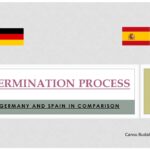This is an extract of the interview held on the 4th of November 2022. Renata Lewicka interviewed Martin Pech.
- You – your specialization – a few words
I am AL at BMKE for almost 7 years. Our main office is in Barcelona but we have also an office in Madrid and in the Canary Islands were I am located.
We are specialized in corporate, tax and employment law, especially for cross-border related matters. We also provide assistance for litigation in these related matters, as well as for inheritance or property purchase in Spain, the topic we want to talk about today.
- Your favorite coffee?
In the Canary Island we have one coffee that you will not find in the rest of Spain, which is the called barraquito:
The layers of a barraquito are normally:
-
-
- Coffee
- Licor 43
- Frothed milk
- Condensed milk
-
Other ingredients typically used:
-
-
- Lemon peel
- Cinnamon
-
- How Spanish drink coffee?
Most of the people just stop by at a Cafeteria to take a cortado (an expresso) and on their way or during work. Then there are people which make the coffee time a full event and can spend hours in the Cafeteria.
So maybe if you are looking for someone and cannot reach him at his workplace maybe you should check the Cafeteria nearby.
- How to wisely buy real estate in Spain? A few basic advise for someone considering to buy property in Spain?
First at all, you should have clear what and for what you want to buy: Are you buying a property because you are going to live with your family and work in Spain, are you going to buy a property for a second residence during holidays or are you going to buy a property for an investment.
So attending to personal circumstances, I would recommend go and have a personal look, stay some days at the place and check the region and, make sure that this fits you.
Then you start searching for properties which normally would imply to search on the internet and to contact a real state agency, where most of the properties are listed. Here it is also important, DON’T be in a rush and DON’T sign anything in a rush and with conditions you do not understand.
Then the Real Estate Agents have mostly interest in sell fast. But for a secure investment you should check in any case:
-
-
- The status of the property at the property register. Who is the owner? Are there any encumbrances? Has the property been coordinated with the cadaster? It is recommendable to let the property been checked with a legal advisor
-
-
-
- Will you have to finance the object? The Spanish Bank can take time to study if they are going to give you a mortgage for the object.
-
-
-
- What will be the conditions for the sell? Do you need to sign a precontact? In some cases, the precontract could end in a trap.
-
- The biggest legal traps when purchasing properties.
In most cases and specially the Real State Agents will make you sign precontract. The most widely used precontract is the called “contrato de arras” which is basically a deposit contract. The purchaser pays an amount of the price (normally around 10%) as deposit and the object is reserved until the public deed of purchase is signed.
If the buyer finally decides not to buy the property having signed this contract, then the buyer will lose the amount of the deposit. On the other hand, if the seller does not sell the property as agreed, then normally they have to return double the deposit amount.
And here is the problem of these contract: Even with a signed contrato de arras, the seller could still sell to another interested candidate when that candidate will offer more money and buy you out. Then you will receive the deposited amount in double, but will not able to buy the property.
In that sense, we as legal advisor recommend to the purchaser not to sign a contrato de arras but a purchase option contract. With this contract the purchase has more control over the situation and the seller has not the option to buy you out of the contract. The purchaser can enforce the contract if the seller is not willing to sign the public deed.
Other problems appear with the bank. If you need a mortgage you will definitely need time. Not only that the bank will study your case and might reject it, for a mortgage you will have to go twice to the Notary:
-
-
- Once during a precontractual phase in which the Notary will check that you have received all information of the Bank and what consequences will it suppose that to sign the mortgage deed. This is something new that has been introduced for 1-2 years in order to protect the interest of the buyer as “consumer”. The Notary will make a Minute of this Meeting which be at least 10 days before signature of the purchase deed.
-
-
-
- The second will be at the signature of the purchase in which you also will sign the mortgage deed.
-
So the Bank might complicate your purchasing process. In fact, knowing that banks have to proceed through a KYC process it can take time a month.
But even without buying a property though the bank, we have seen cases in which already paid back mortgages are still registered in the Property Register because the Bank has not signed the mortgage cancellation yet because of problems of the entity: entity has been bought by another bank, they can’t find the documents of the mortgage, no person with powers available to sign the cancellation…
So it is definitely recommendable to have assistance in this process at all.
- Do you need to be a citizen/tax resident to buy property?
No. But you will have to get an Identification Number in Spain. This number is the called NIE (Number for Identification of Foreigners) and this number makes your life much easier in Spain.
Because the number is also your Tax Identification Number once registered before the Tax Agency, which you will need to submit the taxes of the purchase.
The NIE Number is also mandatory for the registration of the purchase deed in the property register. And only with such number you will be able to open a bank account, the will ask you for it for the contract with the suppliers, etc.
Actually one of the biggest complication is to get such Number, because in Spain the competent Authority to grant this Number is the Police Administration which premises are normally every day overcrowded and it is difficult to even to book an appointment.
It is also possible to obtain this Number through the Spanish Embassy at the country were you actually living if you declare that you need this for the purchase of the property in Spain, so this can be a recommendable way to obtain the number.
- What does the real estate acquisition process look like? Legal must have.
So as commented before, normally you start the process with a precontract between purchaser and seller, but it is not a must have. If parties have clear the object, the conditions and the payment you can start the process directly with the Notary.
The purchaser chooses and pays the Notary. It is mandatory the public deed for the registration before the Property Register.
The Notary will ask for some documentation: normally these are accreditation of payment of taxes, Homeowners Community if there is one, Energetic Certificate, condition of the payments. In some regions you will also need certificate of occupancy to certify that if the property may be used for living.
The Notary will apply for a certification to the Property Register and the Cataster Register of the object.
Why do you need legal advice in this process if the is the Notary? Because even in the easiest cases there might come unseen complications: the document from the Register is not the same as the certification that the Notary has obtained, the seller has not all required documents (i.e. the energetic label or occupancy has expired) and also even the Notary deed can be quite complicated to be understand for people who are not used to legal terms.
The Notary will also, and this is new, apply for a certification of the reference value of the object. This value is given by the Cadaster but is not the cadaster value of the object. The reference value is calculated annually on basis of all the prices of the purchased properties in the region and with similar character (among other criteria). This reference value is important because the tax for the purchased object will the highest amount between this reference value or the price declared in the deed.
Once the deed has been signed, this will go to the Property Register for registration, after you have paid the taxes.
- What taxes apply to real estate in Spain?
Basically when you purchase a property you have to pay the purchase tax (ITP). The tax rate is different depending the Autonomous Region you are buying the property. In example, in the Canary Islands the rate is 6,5% and in Catalonia 10% over the purchasing amount.
When you sell the property you might be subject to pay income tax over the capital gains.
Furthermore, if you are not living in Spain, but leasing the property to third parties you will be subject to pay Income Tax as non-Resident in Spain over the rental income.
And even if you do not lease the property at property at all, you will have to pay yearly an Income Tax as non-Resident in Spain for the eligible income of the real estate. It basically creates a fiction that you as property holder in Spain generate an income because of have the property. The amounts are not high because it is calculated over the cadester value (around 1% of the value), but this is still a payment you have to do every year.
Apart to this there is the IBI (Real Estate Tax) which is the yearly tax to be paid to the local administration.
- Leasing a property in Spain – three important things
If you going to lease a property, you are generally covered by the regulations of the Spanish Leasing Act.
If you are going to buy a property to invest and lease the object, it is important to take into account:
-
-
- Leasing on long term. As the lease is subject to the Spanish Leasing Act. the minimum duration of contract is 5 years, but the Tenant has the right to withdrawal from the contract after 6 months. The lessor is entitled to a compensation if regulated in the contract.
-
In some regions and specially cities with high fluctuation there are regulation over the rental price that should be taken into account and studied individually.
-
-
- Leasing for holiday rental. Some regions have regulation for holiday rental which might be restrictive. This is something also to be checked before purchasing an object that are going to be investment for this kind of leasing.
-

